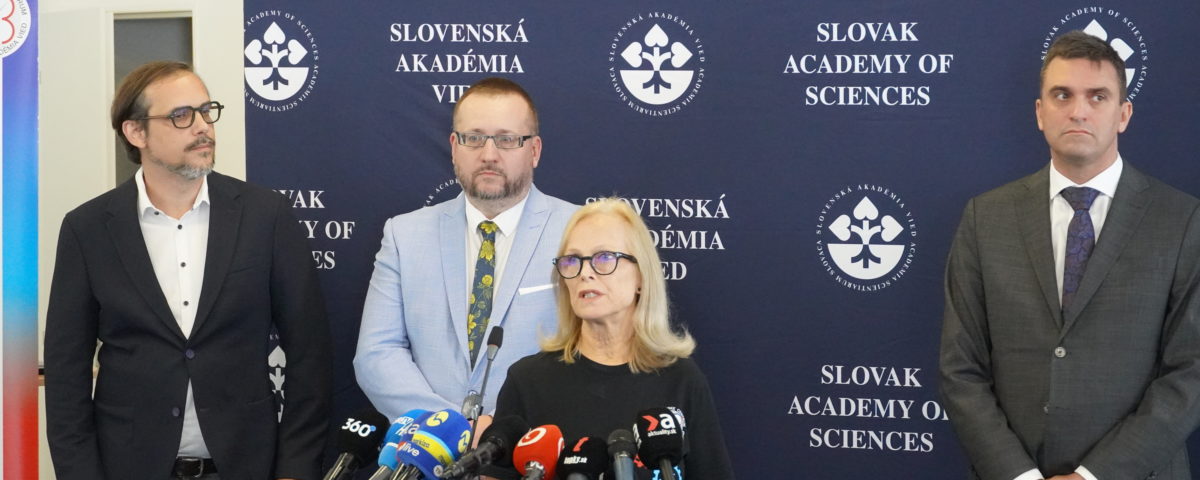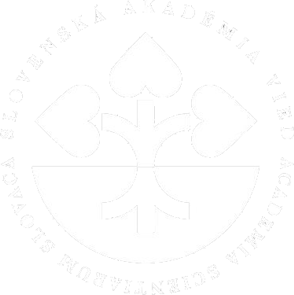This website uses cookies so that we can provide you with the best user experience possible. Cookie information is stored in your browser and performs functions such as recognising you when you return to our website and helping our team to understand which sections of the website you find most interesting and useful.
The Biomedical Research Center of the SAS provided detailed information on the results of mRNA vaccine analysis

Podrobnosti o analýze sme predstavili na tlačovej konferencii. Zľava riaditeľ ŠÚKL Roman Dorčík, rektor Univerzity Komenského Marek Števček, riaditeľka BMC SAV Silvia Pastoreková a predseda SAV Martin Venhart.
On July 30, 2025, the Biomedical Research Center of the Slovak Academy of Sciences (BMC SAS) completed a quantitative analysis of residual DNA and other substances in selected batches of mRNA vaccines against COVID-19. The results of the analysis confirm that the amount of residual DNA in vaccines is below the specified safety limit and that vaccines do not contain substances that manufacturers would not declare.
“Based on our comprehensive analysis and the latest scientific knowledge, we can unequivocally assure the public that the amount of residual DNA in mRNA vaccines complies with standards and, moreover, that this DNA is fragmented, meaning that it is not found in its entirety in the vaccines but is broken down into small pieces. At the same time, we want to emphasize that there is no credible scientific or medical evidence that this residual DNA alters the human genome,” says BMC SAS Director General Professor Silvia Pastoreková.
Researchers from BMC SAS, the Chemical Institute of the Slovak Academy of Sciences, and the Science Park of Comenius University in Bratislava participated in the analysis. The results were published on September 1, 2025, in the form of a preprint on the Research Square platform. They are currently being evaluated in the respected international scientific journal NPJ Vaccines.
The vaccines analyzed came from official warehouses certified by the State Institute for Drug Control (ŠÚKL). There were nine batches of Pfizer/BioNTech–Comirnaty and six batches of Moderna–Spikevax. Eleven of the batches analyzed were the same as those that were the subject of interest to the government representative and came from the same source.
“Our analysis provided objective and verifiable data, contributing to a rational discussion about mRNA vaccines. There are many false claims based on technically incorrect methods and misinterpreted results, which are a dangerous source of manipulation of the public through fear, and this can have serious consequences for public health,” said Dr. Juraj Kopáček, director of the BMC SAS Virology Institute. The analysis of the composition of mRNA vaccines, carried out with the financial support of the Ministry of Health of the Slovak Republic, therefore represents an important step in the fight against dangerous medical misinformation.
Based on the data obtained, the BMC SAS has prepared a comprehensive report detailing and explaining the results and methods of analysis. The report also explains why fragmented residual DNA in vaccines has no effect on human health.
The results of the analysis are also valuable for assessing the safety of mRNA vaccines.
“After assessing detailed data on the consequences of administering more than 13 billion doses of mRNA vaccines worldwide, we can clearly state that vaccination is significantly safer than contracting COVID-19. The likelihood of serious consequences after recovering from COVID-19 is many times higher than after vaccination,” adds Professor Pastoreková.
Vaccination is a key prevention tool that helps protect the most vulnerable from many serious diseases. In just the last few decades, vaccination has saved millions of lives and limited or even stopped the spread of many dangerous infectious diseases. Vaccines are among the most strictly controlled medicines, and each vaccine must be proven to be safe, effective, and of high quality. Claims that deny the success of vaccination and distort possible side effects stem from a misunderstanding of the issue and seriously threaten public health as well as the health of individuals.
“Viruses don’t care what we think. No other medical intervention has saved as many lives in the world as vaccination, and that’s a fact, not an opinion. I want to speak to people who are confused by media statements and don’t know who to believe. No system is perfect, and there is always room for improvement, but that does not mean that thousands of experts around the world would approve a vaccine that is not safe, effective, and of high quality,” adds ŠÚKL Director Roman Dorčík.
Information on the analysis
During the analysis, the quantity, quality, and origin of residual DNA in the delivered batches of mRNA vaccines were determined.
- The quantity of residual DNA was determined using quantitative PCR and fluorometry.
- The fragmentation of residual DNA, which reflects the degree of its degradation, was determined using capillary electrophoresis and sequencing analyses.
- The origin of residual DNA was determined by second-generation sequencing.
- The potential presence of other substances was evaluated using Raman spectrometry.
The combination of several independent methods enabled an accurate and comprehensive assessment of the amount and composition of residual DNA, as well as the content of other substances in mRNA vaccines. The results of all methods performed were consistent with each other.
The amount of residual DNA in all batches analyzed was below the internationally established safety threshold. Analysis of the quality of residual DNA showed that in the samples, this DNA is degraded into short fragments that do not encode any functional protein. The fragments originate from DNA that was used as a template for mRNA synthesis in the vaccine manufacturing process. All batches also contained the amount of mRNA declared by the manufacturer. No substances not listed by the manufacturer in the registration documentation were detected in the delivered vaccine batches; specifically, these vaccines did not contain graphene or its compounds.
As part of the analysis, BMC SAS has acquired a unique device, known as a “fragment analyzer”, which is the first of its kind in Slovakia. Scientists will make intensive use of it in researching infectious, tumor, genetic, and metabolic diseases.
Contact persons:
Ela Rybárová, PR Manager, BMC SAV, v. v. i., tel.: 0911 744 756
Monika Tináková, SAV spokesperson, tel. no. 0910 833 021
Lucia Balážiková, ŠÚKL spokesperson, tel. no.: 0911 305 765
Text and photo: E. Rybárová, BMC SAS








